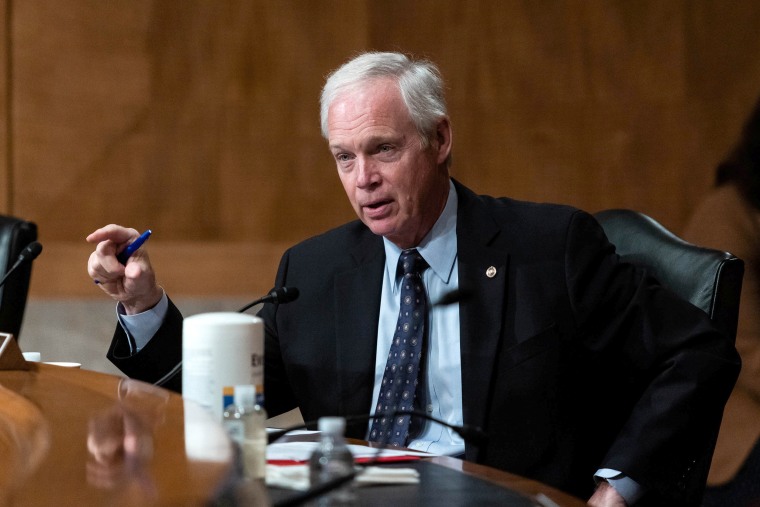The New York Times noted a few months ago that Sen. Ron Johnson (R-Wis.) "has become the Republican Party's foremost amplifier of conspiracy theories and disinformation now that Donald Trump himself is banned from social media." The Wisconsin Republican has invested an unnerving amount of effort into proving the analysis right.
As we've discussed, when it comes to taking stock of Johnson's propensity for peddling nonsense, it's convenient to rely on separate categories. For example, the GOP senator has been cavalier about his indifference to an FBI warning that he was "a target of Russian disinformation" during the last election cycle. He's also denied ever having "talked about the election being stolen," despite ample evidence pointing in the opposite direction. Johnson's nonsense about the Jan. 6 attack has been especially ridiculous.
But when it comes to threatening public health, the Republican's rhetoric about the pandemic has been especially pernicious. As NBC News reported, it's even led to some mild punishment.
YouTube suspended Sen. Ron Johnson's account on Friday after the Wisconsin Republican posted his recent remarks about alternative therapies to treat Covid-19. "We removed the video in accordance with our COVID-19 medical misinformation policies, which don't allow content that encourages people to use Hydroxychloroquine or Ivermectin to treat or prevent the virus," a YouTube spokesperson said in a statement.
Johnson was predictably outraged, whining about "government-sanctioned censorship" -- YouTube is a private company, and the senator appears to be confused about what "censorship" means -- and insisting that he's promoting "science," all evidence to the contrary notwithstanding.
To be sure, the sanction was modest: YouTube suspended the senator's account for a week. As punishments go, this could hardly be characterized as severe.
Nevertheless, this will likely be seen as the latest example, touted by Republicans, of Big Tech's campaign against the right. This will, of course, be wildly wrong: YouTube has a policy against content that spreads medical misinformation during a pandemic. Johnson violated that policy and is now dealing with the consequences.
If Democratic senators had done the same thing, they'd face the same punishment.
What's more, this is part of a deeply unfortunate pattern for the Wisconsinite. Last month, for example, Johnson, while claiming to be "just asking the questions," publicly raised the prospect of a possible connection between vaccinations and deaths.
Circling back to our earlier coverage, it was just two weeks earlier when the senator also appeared on a Wisconsin radio show to insist the COVID vaccine is "not a fully approved vaccine"; he's "getting highly suspicious" of the "big push to make sure everybody gets the vaccine"; there's "no reason" to encourage Americans to get vaccinated; and he has "doubts" in response to White House requests that the public should "trust the government."
Alas, this wasn't an isolated incident. As regular readers may recall, in mid-March 2020, as the scope of the coronavirus crisis was just coming into view, the Wisconsin Republican went further than most in downplaying the importance of mitigation efforts. As part of his case, the senator told the Milwaukee Journal Sentinel, "[W]e don't shut down our economy because tens of thousands of people die on the highways. It's a risk we accept so we can move about." This was a tragically bad argument, for reasons he didn't seem to fully grasp.
A couple of months later, Johnson was seen on the Senate floor without any facial covering. "I wear a mask when I go into grocery stores, that type of thing," the GOP senator said. "I think around here, we probably won't have to." This, too, was wrong.
In July 2020, Johnson argued that the United States "overreacted" in response to the coronavirus pandemic, which was unfortunate at the time, and which is a perspective that looks much worse now.
In late 2020, Johnson sunk lower, holding multiple Senate hearings to promote pseudo-science and conspiracy theories. Dr. Ashish Jha, dean at Brown University School of Public Health, appeared as a witness at one of the Senate hearings and was amazed by the Wisconsin senator's apparent suspicion that there's a "coordinated effort by America's doctors" to deny patients hydroxychloroquine because of a corrupt scheme involving physicians and the pharmaceutical industry.
The far-right senator's second term ends next year. He has not yet said whether he'll ignore his earlier term-limits pledge and run for re-election. In the meantime, if there's a competition among Senate Republicans to see who can be the most irresponsible about the pandemic, Ron Johnson appears to be in the lead.
